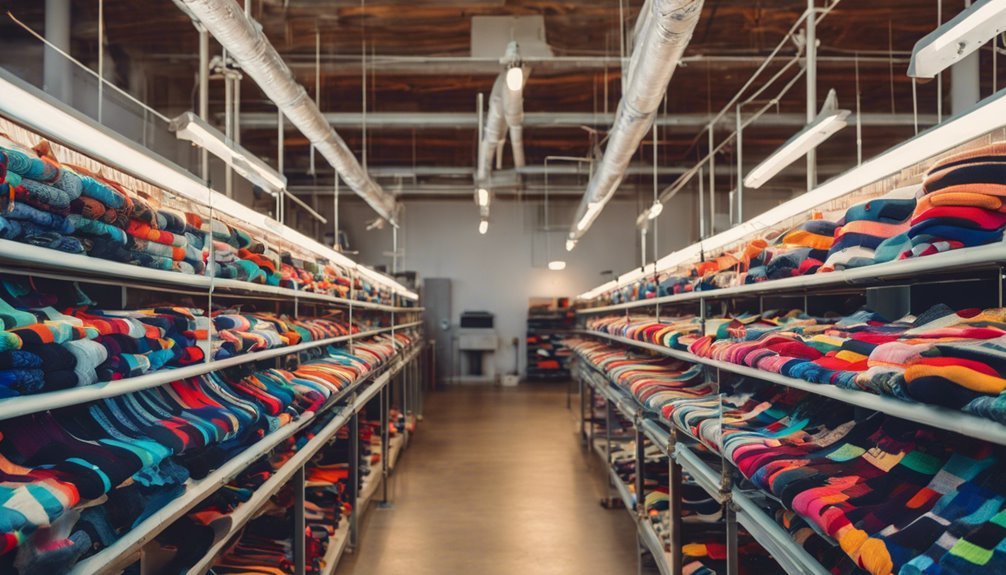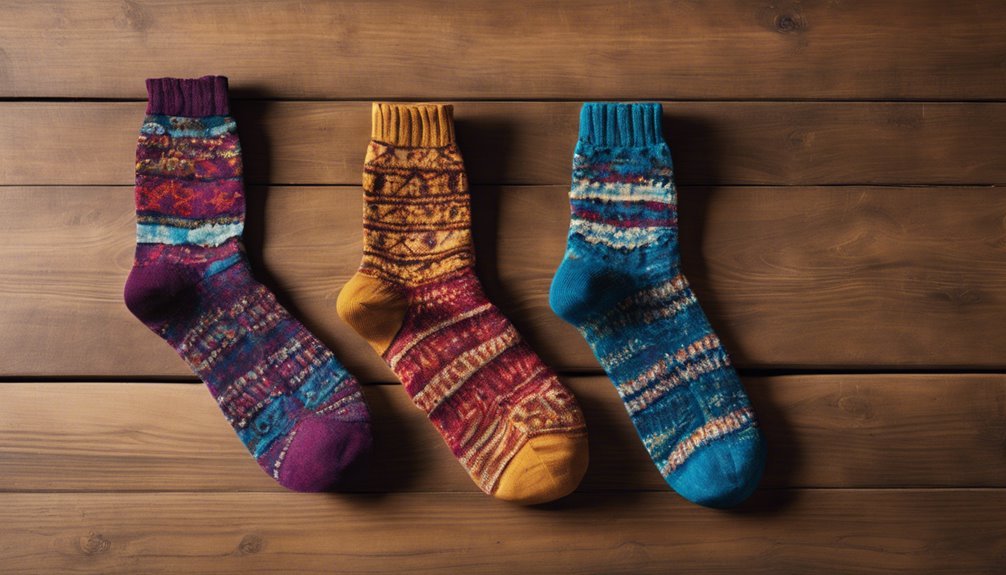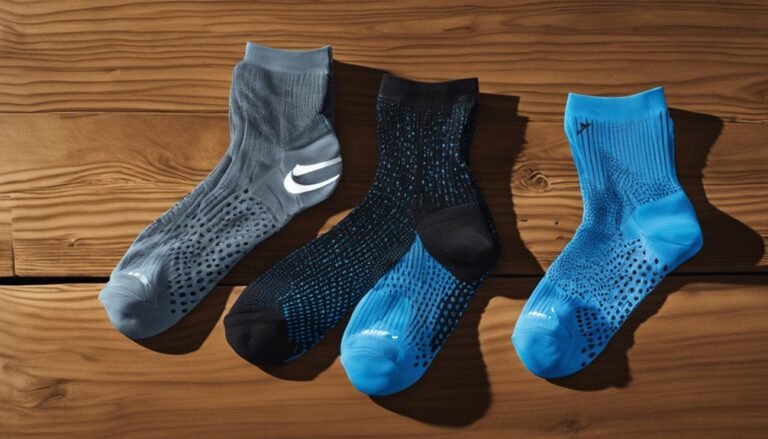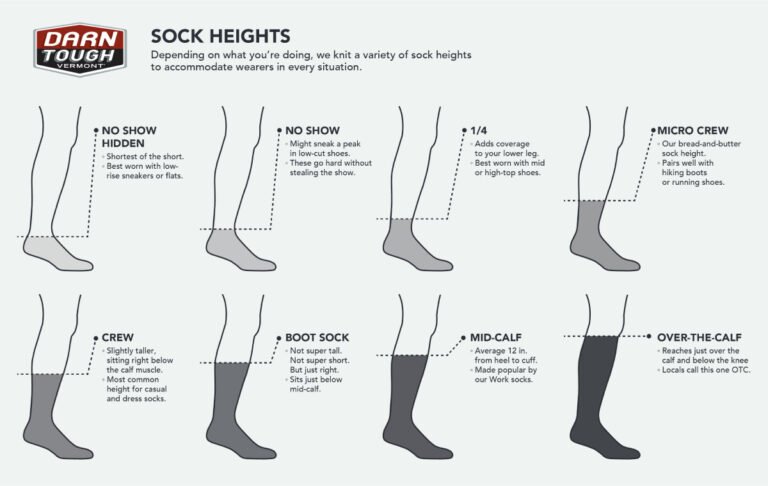Handmade vs. Machine-Made Socks: Which One Is Better for Comfort?
When comparing comfort between handmade and machine-made socks, handmade options usually excel. Their intricate craftsmanship and tailored fit enhance breathability and moisture management, thanks to the use of natural fibers like merino wool and cotton. In contrast, machine-made socks prioritize consistency through synthetic materials, which can sometimes compromise comfort. Ultimately, if you're seeking a more personalized feel, handmade is likely the better choice. However, there are more factors to take into account that can impact your overall decision.
The Art of Handmade Socks

While many may overlook the intricate craftsmanship behind handmade socks, these creations embody a level of artistry that machine production simply can't replicate. The diverse knitting techniques used by artisans allow for a unique blend of structure and flexibility, enabling you to feel the difference in comfort and fit. Each sock can showcase creative designs, reflecting your personal style while providing warmth and durability. The meticulous attention to detail guarantees that every stitch contributes to the overall integrity of the fabric, enhancing both aesthetic appeal and performance. This intentional approach fosters a connection between the maker and the wearer, resulting in a product that isn't just functional but also a form of self-expression. Handmade socks truly offer an unparalleled experience.
The Efficiency of Machine-Made Socks
When considering machine-made socks, you'll notice their speedy production process greatly reduces lead times. These methods guarantee consistent quality standards across large batches, minimizing defects and variations. Additionally, the cost-effective manufacturing processes contribute to lower prices, making machine-made socks an attractive option for consumers.
Speedy Production Process
Although traditional craftsmanship has its charm, the efficiency of machine-made socks is undeniable, particularly in their production speed. With advanced knitting machines, manufacturers can drastically reduce production timelines, enabling them to produce large quantities in a fraction of the time it would take to handcraft each pair. This rapid output not only meets market demand swiftly but also maximizes labor efficiency, as fewer workers are needed to oversee automated processes. Consequently, businesses can respond quickly to trends and consumer preferences, ensuring that you always have access to the latest styles. Ultimately, if you value not just comfort but also the availability and variety of socks, machine-made options offer a practical solution without sacrificing essential elements of design and functionality.
Consistent Quality Standards
Many consumers appreciate the consistent quality standards that machine-made socks deliver. Unlike handmade options, machine-made socks undergo rigorous quality control processes, ensuring each pair meets predefined specifications. This production consistency is crucial for maintaining comfort and durability across large batches. Automated machinery allows for precise measurements and uniform tension, which considerably reduces the likelihood of defects. When you choose machine-made socks, you can trust that each pair is crafted with the same level of care and attention to detail. This reliability means you won't face unexpected variations in fit or fabric quality, allowing for a more satisfying wearing experience. Fundamentally, machine-made socks provide a dependable choice for those seeking comfort without compromise.
Cost-Effective Manufacturing Methods
Cost-effective manufacturing methods play an essential role in the production of machine-made socks, enabling brands to offer high-quality products at competitive prices. By utilizing bulk production techniques, manufacturers can achieve significant cost savings through economies of scale. This approach enhances manufacturing efficiency, allowing for faster turnaround times without sacrificing quality.
| Manufacturing Method | Advantages |
|---|---|
| Bulk Production | Lower costs, increased output |
| Automated Machinery | Consistency, speed |
| Quality Control Systems | Reduced defects, reliability |
Investing in advanced technologies guarantees that machine-made socks meet consumer demands while maintaining affordability. Ultimately, these cost-effective methods allow you to enjoy comfortable socks without breaking the bank, providing a sense of freedom in both style and budget.
Materials Used in Handmade Socks
When it comes to handmade socks, the choice of materials is essential for both comfort and durability. Artisans often utilize natural fibers like wool, cotton, and bamboo, which offer unique properties such as breathability and moisture-wicking. Understanding these materials, along with the craftsmanship techniques employed, can enhance your appreciation for the quality and performance of handmade socks.
Natural Fibers Utilized
While the choice of materials greatly impacts the quality and comfort of socks, handmade options often prioritize natural fibers that enhance breathability and durability. These materials not only provide exceptional comfort but also cater to various texture preferences. Here are three commonly used natural fibers in handmade socks:
- Merino Wool: Known for its softness and moisture-wicking properties, it regulates temperature effectively.
- Cotton: Offers excellent breathability and is hypoallergenic, making it a great choice for sensitive skin.
- Bamboo: Naturally antibacterial and eco-friendly, it provides a silky texture with excellent moisture absorption.
Craftsmanship Techniques Employed
Craftsmanship in handmade socks relies on a variety of techniques that enhance both their functionality and aesthetic appeal. You'll notice that skilled artisans often employ intricate knitting techniques, such as ribbing and cables, which not only provide elasticity but also add visual interest. These methods allow for a snug fit while accommodating the foot's natural contours. Additionally, unique weaving patterns contribute to the overall durability and breathability of the fabric, enabling moisture-wicking properties essential for comfort. By selecting high-quality natural fibers, artisans can further elevate the tactile experience. Each pair of handmade socks reflects a commitment to craftsmanship, ensuring that every detail—from the yarn to the finishing touches—plays a critical role in delivering comfort and style.
Materials Used in Machine-Made Socks
Although machine-made socks are often perceived as less personal than their handmade counterparts, the materials used in their production play an essential role in their performance and durability. The use of synthetic fibers in machine-made socks enhances their moisture management capabilities, ensuring your feet stay dry and comfortable throughout the day. Here are three key materials commonly found in machine-made socks:
- Nylon: Offers strength and elasticity, helping the socks maintain shape.
- Polyester: Great for moisture-wicking, it quickly pulls sweat away from your skin.
- Spandex: Provides stretch for a snug fit, allowing for freedom of movement.
These materials work together to create socks that not only last longer but also provide a level of comfort that meets modern demands.
Cost Comparison: Handmade vs. Machine-Made

When evaluating the cost of socks, it's crucial to take into account both handmade and machine-made options to understand their value propositions. Handmade socks generally command higher prices due to their labor-intensive production processes and the quality of materials used. These socks often reflect unique craftsmanship, resulting in price variations that can range considerably based on the creator's expertise and material choices. In contrast, machine-made socks benefit from lower production costs and economies of scale, allowing for mass production at more affordable prices. While you may find machine-made options that fit your budget, consider whether the investment in handmade socks aligns with your values regarding craftsmanship and sustainability. Ultimately, the choice hinges on your priorities regarding cost and quality.
Comfort Factors: Fit and Feel
How do fit and feel impact your sock-wearing experience? The comfort of your socks hinges on how well they accommodate your fit preferences and the feel differences between handmade and machine-made options.
Consider these factors:
- Arch Support: Handmade socks often provide personalized arch support, which can enhance comfort.
- Elasticity: Machine-made socks typically have consistent elasticity, but may not adapt as well to your foot shape.
- Material Texture: The feel of the fabric can vary considerably; handmade options may offer softer, breathable fibers compared to synthetic blends found in mass-produced socks.
Ultimately, understanding how fit and feel affect your comfort can guide you in choosing the right socks for your lifestyle.
Sustainability and Ethical Considerations
As consumers become increasingly aware of the environmental impact of their purchases, the sustainability and ethical considerations of sock production have gained prominence. Handmade socks often utilize ethically sourced materials, minimizing harm to ecosystems and supporting fair labor practices. In contrast, machine-made socks may rely on mass production techniques that prioritize efficiency over environmental welfare. This can lead to significant waste and pollution. When evaluating your choices, consider the lifecycle of the socks you buy—how they're made, the resources involved, and the brand's commitment to ethical sourcing. By choosing sustainable options, you not only support responsible manufacturing but also contribute to a broader movement towards environmental stewardship. Your choices can drive change, promoting a more sustainable future for sock production.
Frequently Asked Questions
How Do Handmade Socks Compare in Durability to Machine-Made Options?
When it comes to durability, handmade socks often shine with their unique craftsmanship, ensuring handmade longevity. However, machine durability typically offers consistent strength, making them less prone to wear and tear over time.
Are There Specific Brands Known for High-Quality Handmade Socks?
When seeking high-quality handmade socks, explore artisan brands known for using premium sock materials like merino wool or bamboo. These materials enhance comfort and durability, providing an ideal choice for those valuing craftsmanship and personal expression.
What Care Instructions Are Recommended for Handmade Socks?
Imagine delicate petals; your handmade socks need gentle care. For ideal longevity, follow care tips: hand wash in cool water, avoid harsh detergents, and air dry. These washing methods preserve their unique beauty and comfort.
Do Machine-Made Socks Have a Specific Lifespan?
Machine-made socks typically have a lifespan of six months to a year, depending on the manufacturing materials used. Higher quality fibers can extend durability, while cheaper materials may wear out more quickly, affecting overall longevity.
Can Handmade Socks Be Customized for Specific Foot Conditions?
Imagine slipping into a tailored embrace; handmade socks offer custom sizing and diverse material options, perfectly addressing specific foot conditions. You can experience unparalleled comfort, ensuring every step feels like walking on clouds.







